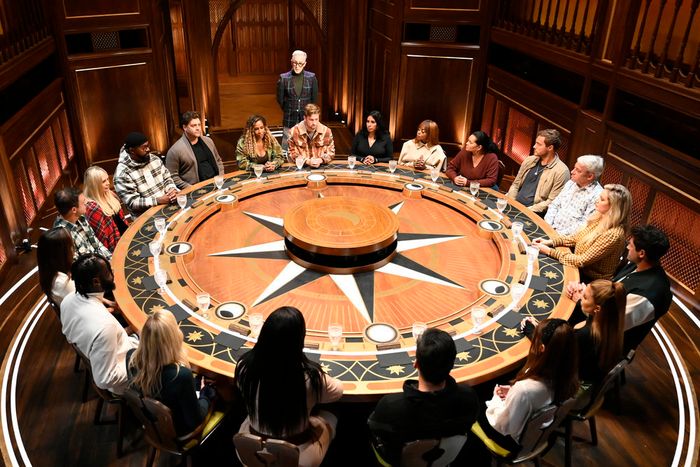
This article was featured in One Great Story, New York’s reading recommendation newsletter. Sign up here to get it nightly.
On a grayish Thursday afternoon in the East Village, Alan Cumming can be found at — where else? — Club Cumming. It’s a bar–cum–performance space–cum–queer community space, and it’s the rare indispensable celebrity side-hustle drinking establishment in a city full of dispensable ones. Club Cumming hosts popular drag shows and showcases young queer comics, and, on lucky nights, Cumming himself performs, but during the weekday, it’s dark and quiet, the bentwood chairs all empty around him. Cumming is finishing his green juice (he is famously vegan) and the remains of an energy bar (he even more famously has a great body at 59) when he ushers me over to the best seat in the house, a table pressed right up against the stage. He bundles up his big, fluffy white coat and lays it on the bench next to him as a bed for his longtime television co-star, his little black silky-haired rescue dog named Lala.
Cumming just got back from a gay cruise where he’d been performing his show, “Och & Oy!,” with Ari Shapiro. The last time he performed on a cruise, it was “like a zombie film, where instead of zombies it’s boys in jockstraps coming for you.” But this year’s cruise “was more sort of murder-mystery gays. Don’t get me wrong, I love them both.” If “murder-mystery gays” are a type, then Cumming has superseded Jessica Fletcher as their king thanks to his role as the host of Peacock’s breakout castle-intrigue reality show, The Traitors. Cumming could have easily coasted into the job on existing star power and the delicious way he purrs about murrrrder and treachery. Instead, he’s giving what might be his juiciest onscreen performance in years, a hybrid acting role that is part narrator, part mediator, and part Scottish Jigsaw, turning what could have been any other “bunch of people living and fighting together in a big house” competition series into one of Peacock’s biggest-ever hits and one of the most-watched unscripted series on streaming so far this year.
“They came to me with this, and I was like, What the fuck? Why?” It’s true that Cumming isn’t the most obvious choice for a Probstian reality host. In an interview with The Guardian in 2019, he said, “I just wish everyone would go on a reality TV show, so we’ll all have done it and we can get it out of our system and move on.” But now that he’s done it, he’s got no plans of moving on. Cumming calls himself a bit of a contrarian; if his team tells him he probably shouldn’t do something, it immediately piques his curiosity. And so, decades into a career that has spanned Edinburgh Fringe to Broadway, art house to X-Men, gay-rights advocacy, children’s-book authorship, fragrance sciences, and a late-career turn as a barman, Cumming is adjudicating scavenger hunts and presiding over D-list-on-D-list-violence. “People are likely to ask me to do weird things because I’ve done weird things in the past. Eclecticism breeds eclecticism.”
For those who are living under a rock or without a Peacock subscription, the premise of The Traitors is the children’s game Mafia on a theatrical scale. Of the 20-some cast members in total, a small number have been secretly assigned the role of “Traitor” and must work in concert to eliminate the majority, the “Faithfuls.” The Faithfuls are aware of the Traitors’ existence but not their identities, and over the course of several weeks, endeavor to sniff them out. The game alternates between phases of Traitor mischief and Faithful strategizing, all of which ultimately looks the same: Players get voted out of the game and are forced to leave the Scottish Highlands castle in which the competition takes place. Currently, there are 22 international versions of The Traitors, including iterations in Flemish, Quebecois French, and one illegal, unsanctioned Russian version. But back when producers approached Cumming to host the series, there was only the Dutch original, which premiered in 2021. Cumming found the premise compelling, and the producers of the American version explained how they would heighten it: “Do it in a big castle, make it so much more glamorous and theatrical. I said, ‘You kind of want me to be a James Bond villain?’ And they were like, ‘Yes!’ I decided that it should be ‘my’ castle. I live in the castle and I’ve invited people to my castle. I made this narrative for myself for it to be able to work.” The castle in question is Ardross, located in the Scottish Highlands, and Cumming’s regal bearing on the show is convincing enough that at least two of my colleagues thought Cumming really did own the joint (he does not).
Cumming arrives at “his” castle for rehearsal a few days before the contestants, and filming takes just under a month. Cumming oversees every step of the game onscreen: interviewing contestants; selecting Traitors; moderating challenges, banishments, and conspiratory Traitor sessions in the castle turret; refereeing the occasional fight; and narrating all of the above to viewers. He never breaks character when interacting with the cast, which is made up this season of miscellaneous minor celebrities and reality stars from established mega-franchises like The Bachelor and Survivor. Early into filming the first season, he figured out who his character was by playing off the cast. “He came to be this stern daddy. He’s cheeky, but also, don’t fuck with him.” And to Cumming’s amusement, the cast seems genuinely scared of him at times, treating him as an almost omniscient voice of God on the show. “I love when they’re in a big, heated argument, and they’re like, ‘Alan said that, blah blah,’ trying to pick up bits of nuance and looking for clues. I love being a part of the narrative.”
Cumming hosted the cast at Club Cumming the other week, getting everyone together for drinks, and he was tickled by their reactions to meeting the “real” him for the first time. “It’s like when you see your therapist on the street, like, Oh! They can stand up!” Very occasionally, a cast member has burst that bubble. He remembers toward the beginning of season one, “I was very nervous, trying to keep my distance from them and play this character, and as Brandi Glanville went past, she goes, ‘I saw Cabaret on Broadway!’” He teases a moment in tonight’s finale where a mishap made him break character briefly with the cast — “You see it a bit in the trailers; we were on this ship, and something happened where I actually did have to engage with them for a little longer than I would have liked” — but reveals no more about the episode.
In addition to hosting, Cumming is credited as a producer on the series. Though he’s not designing endurance challenges like this season’s live burial or last season’s cursed fairground, he informs the playful Gothic style and tone of the series. He works with the writers to script his florid spiels, which he delivers while bidding murdered players adieu (players are “murdered” at night with a note left for them by the Traitors, and they leave before breakfast the next morning), presiding over banishment ceremonies at the roundtable, and introducing elaborate challenges.
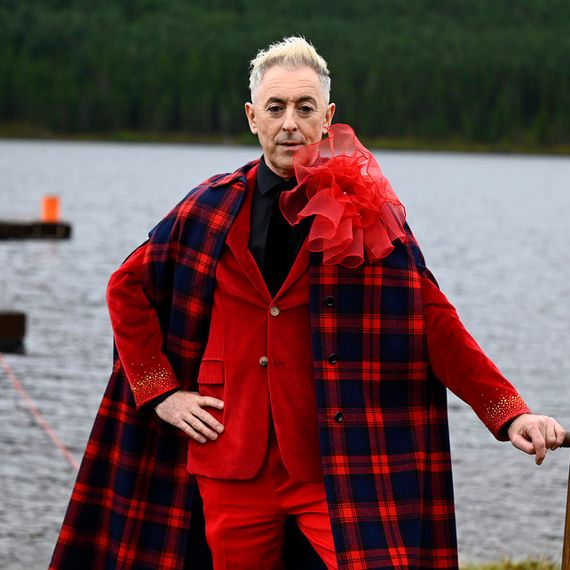
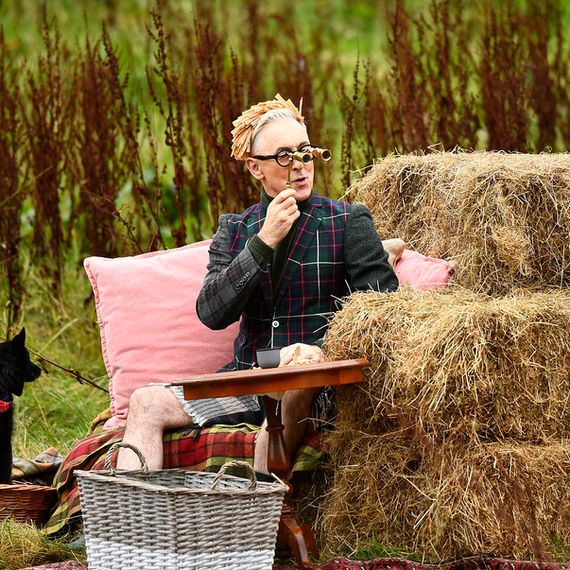
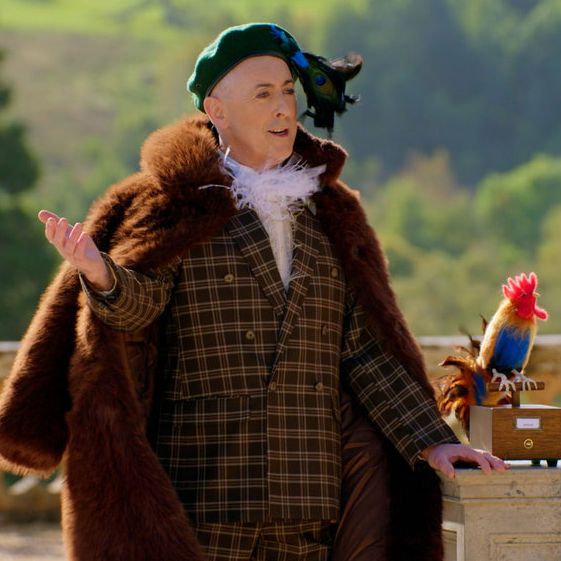
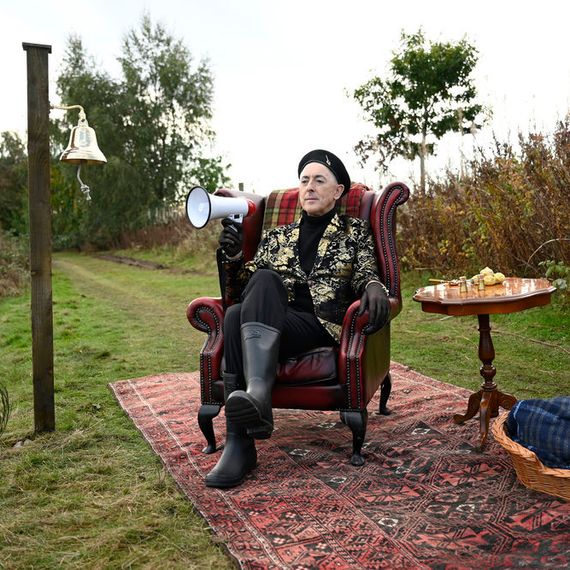
In season one, he fought to quote Shakespeare and Plato, even though the writers thought it wouldn’t click for American audiences. Many of his improvisations have become crucial to the series’ formula; when I tell him that Traitors U.K. host Claudia Winkleman copied his invention of smashing the latest murder victim’s portrait on the floor at breakfast, he gasps, “Bitch stole my look!” Also informing the show’s tone, and often stealing the show entirely, is Cumming’s wardrobe, a collaboration with stylist Sam Spector in which they invented a “dandy Scottish Laird” character for Cumming to play by augmenting jewel-toned tartans and tams — many of them from his own closet — with extravagant flourishes like brooches, ruffles, and sashes. In one birdcall-themed challenge, he wears a floppy beret sprouting peacock feathers, a masterstroke of brand integration. Before Cumming even opens his mouth, the clothes invite viewers to enter a weird little world of fantasy-reality and inform the way Cumming plays the part of game master. “In a way, I am in drag as the host of this show.”
Other producerial duties? Putting out fires when tensions among contestants get too high, probing them for moments of great dialogue (Traitor and former Real Housewife of Atlanta Phaedra Parks makes for an excellent scene partner), and helping decide who the season’s Traitors will be and how many. A good Traitor is never the first person viewers would expect, but they have to be totally committed to scheming and trickery, too. Sometimes, that means a quiet strategist. Other times, it’s just someone who will be fun for the audience to spend a lot of time with. This year, Cumming and the other producers decided to shake up the amount of Traitors chosen during the first ceremony so the cast couldn’t identify tropes and patterns from the previous season. They also introduced preselection interviews between Cumming and each cast member to gauge whether they’d make a compelling Traitor or if they even wanted to be one. “There’s got to be drama. People would think Dan was prime Traitor material; Phaedra, absolutely not, but she had good meme potential. That was the rationale, the surprise element: the double bluff of Dan and the mix of shock and she would bring it of Phaedra. What is good telly and what is a good game? Most often, they coincide.” The producers decided on their Traitors shortly after the interviews, a couple of hours before the tapping-on-the-shoulder ceremony.
Cumming admits this is the most nerve-racking thing to film. “It’s my least favorite part of the whole show. First of all, we go around the whole table and I tap everybody so they’ve got it all on-camera. It makes everyone feel like It could be me! Then I go round and round and round. It’s so quiet. I stop. I squeak my shoes. I make noises with the fabric of my sleeve. Last year, I went around backwards. It’s really so terrifying for me because I feel the tension.” For the record, this is probably the part of the show that most resembles a game of Mafia you might’ve played at summer camp; it’s remarkable how much drama the show can wring from something so lo-fi. “I’m always worried that I could fuck it up if I bash the wrong person. There’s 21 of them squashed in at that table. Johnny Bananas was sitting really close to Phaedra and it was hard to get my arm in.”
Oftentimes, Cumming feels like a viewer of the TV show as it’s unfolding in front of him, watching players make bad decisions, unable to stop them. He compares the show to a sociological experiment, an exercise in pack mentality. He points to how Parks fiercely clung to and defended a clique of former Bravo stars, citing their shared experience as a reason to trust one another. “It was Lord of the Flies: Housewives. The way Phaedra’s like, ‘Don’t come for the Housewives,’ is so counterintuitive to what the game’s about. It encourages a very open alliance purely because they were on the same network. Bravo against the others.” When alliances in the game are built on long-standing personal histories, it makes those moments of fissure — like when current RHOA cast member Shereé Whitfield wisens up to Parks and votes her out — that much more impactful. “But it’s juicy as anything,” says Cumming.
The flip side comes in those moments when he can watch contestants come into their own and upend expectations. This season, he points to Peter Weber, who led efforts to get Traitors Dan Gheesling and Parvati Shallow eliminated and rejected an offer to be recruited by them. Shallow is an example of someone who might have been too obvious a choice of Traitor, having earned a reputation as a fierce tactical player on multiple seasons of Survivor; when Parks and Gheesling recruited her early on in the season, it seemed like she could go all the way, but Weber was onto her from the jump. “I think Pilot Pete has confounded the notion that people who are good at games like Survivor are going to have an advantage. He’s the pretty boy from The Bachelor, and he’s the one who has done great strategy and kind of nailed it.”
One major upgrade for season two was the “big telly” in Cumming’s castle changing room, where he had a behind-the-scenes live feed of every room to spy on contestants scheming and socializing between challenges. “I can hear what they’re saying at breakfast: what the mood is, who’s freaking out. I can hear them talking about me. It’s sort of my villain’s lair.” He uses this info to “turn the screws a bit,” getting quotes out of players and catching them off guard. There’s magic in the show’s high-low contrast; one minute, Cumming will be reciting a poetic adage about death, and the next, he’s laughing watching contestants getting snatched up in giant nets in the woods, Looney Toons–style. He enjoys watching the show up the ante as it goes, citing a recent challenge where bugs were dumped on players in the dark. “They were all so exhausted. They have to do all these physical things, and they don’t get to sleep much. It’s sleep deprivation, physical exhaustion, and mental mindfuck …” There’s a wicked gleam in his eye. “It’s hilarious.”
There’s a misconception about reality TV, that drama and action are all manufactured and drummed up in the edit. In Cumming’s telling, things are far more dramatic in person. The season-one finale, in which traitor Cirie Fields fooled everyone, making her way to the end and taking the entire cash prize, was “heavily edited because it was so awful. They really turned on her.” Cumming had already left the bonfire set where the finale was filming, but production rushed him back to defuse the situation. “I had to give her a hug — she just won this fucking thing, and she said this money was really going to change her family’s life! She was being pounded with guilt and really mean words by two very wounded people: Quentin was just furious, and Andie was devastated because of their personal friendship with Cirie. This went on for quite a while before they brought me back.”
But these are the twists that make The Traitors so addicting. Cumming attributes its success to people’s fascination with lying, and also the old-school weekly release schedule. “It’s the water cooler — we haven’t had that for years! Things to do with mystery and intrigue and obsession are better when they’re collective, because you get to talk with other people and obsess with them. Maybe our days of binging are ebbing.” Cumming’s as obsessed with the series as everyone else, and he’s both “lonely” and “crazy with power” as the season airs and he’s sitting on spoiler-filled tea. But he’ll soon have a distraction in season three, which begins filming this spring. “There will be more Lala content next season,” Cumming teases, as the starlet quietly stands up to let us know it’s time for her walk. “Producer Sam Rees-Jones said, ‘I know we need more Lala content, believe me, that’s been discussed with the studio,’ when all she does is just sit there in a kilt.” Cumming dons his fluffy white coat, gets Lala leashed up, and heads out. It’s a Thursday: He’ll go home, make dinner for himself and his husband, and set it up in front of the TV. Traitors is on.
More From ‘The Traitors’
- The Best TV Shows of 2024 (So Far)
- Who’s This Queer Royal on The Traitors?
- Who’s Going to Get Their Murder on in Scotland?



